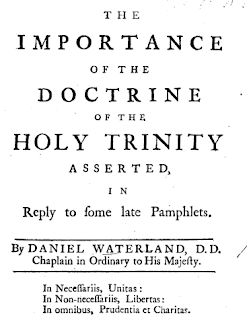"Content to rest in generals": Waterland against "prying too far into" the doctrine of the Trinity
In the face of the anti-Trinitarian attempts of the early- and mid-18th century to dilute and undermine the Church of England's commitment to Trinitarian orthodoxy, Waterland was - in the words of Holtby's study - "the champion par excellence of orthodoxy in the first half of the eighteenth century". The extracts offered from The Importance of the Doctrine of the Trinity Asserted give some indication of the significance of Waterland's teaching and witness. He rightly presented the doctrine of the Trinity as so fundamentally interwoven with, and inherent to, the worship, creeds, teaching, and thought of the catholic Christianity professed by the Church of England that the "common Christians" in the pews of the parish church were necessarily Trinitarians. The attempt to encourage comprehension of anti-Trinitarian teaching was, therefore, nothing less than an attempt to overthrow and radically re-order the Church of England.
Crucially, Waterland defended the sufficiency of the creedal statements: while the Church's witness would be deeply disordered by falling short of these, there was no need - outside learned debate and controversy - to go beyond these statements.
Today's extract offers a defence of the "common Christians" saying the Gloria Patri or reciting the Creed according to the Book of Common Prayer as sound confessors of Trinitarian doctrine. This, contrary to the historiography promoted by 19th century Tractarians and Evangelicals, leads us to view the typical Georgian parish church as an exemplar of creedal orthodoxy.
It has been sometimes objected, that however clear the Doctrine may seem to be to Men of Parts and Learning, yet certainly it cannot be so to common Christians. But why not to common Christians, as well as to others? It is as clear to them as most other high and divine Things can be. It is as clear, for instance, as the divine Eternity, or Omnipresence. Every common Christian professing Father, Son and Holy Ghost, to be so distinct as not to be one the other, and so united as to be one God, has as clear an Idea of what he says, as when he prays, Our Father which art in Heaven; or when he repeats after the Psalmist, "Thou art about my Path, and about my Bed, and spiest out all my ways". And, I am persuaded, upon Examination, he will be as able to give as good an Account of the one, as he will of the other. The Thing is plain, and intelligible in either case, but in the general only, not as to the particular manner.
... let it be here considered, whether common Christians may not often have clearer Ideas of those Things, than the bolder and more inquisitive, because they are content to rest in generals, and to stop at what they understand, without darkening it afterwards by Words without Knowledge. The Notion of Eternity, for instance, is a clear Notion enough to a common Christian: But to a Person that perplexes himself with nice Inquiries about Succession, or past Duration, that very first Notion which in the general was clear, may become obscure, by his blending Perplexities with it. The like may be said of Omnipresence: The general Notion of it is competently clear: But when a Man has been perplexing his Thoughts with curious Inquiries about a substantial or a virtual Presence, about Extension or Non-extension, and the like; I question whether at length he may come away with so clear or just Ideas of the main Thing as may be found in any common Christian. So again as to divine Foreknowledge and Free will, they are both of them clearly understood, as far as they need be, by every plain Christian; while many a conceited Scholar, by darkening the Subject with too minute Inquiries, almost loses the sight of it.
In like manner, to apply these Instances to our present Purpose, common Christians may sometimes better preserve the true and right general Notion of the Doctrine of the Trinity, than the more learned Inquirers: And it is observable, what Hilary of Poitiers, an honest and a knowing Man of the 4th Century, testifies, that the populace of that Time, for the most part, kept the true and right Faith in the Trinity, when their Ministers, several of them, by prying too far into it, had the Misfortune to lose it.




Comments
Post a Comment